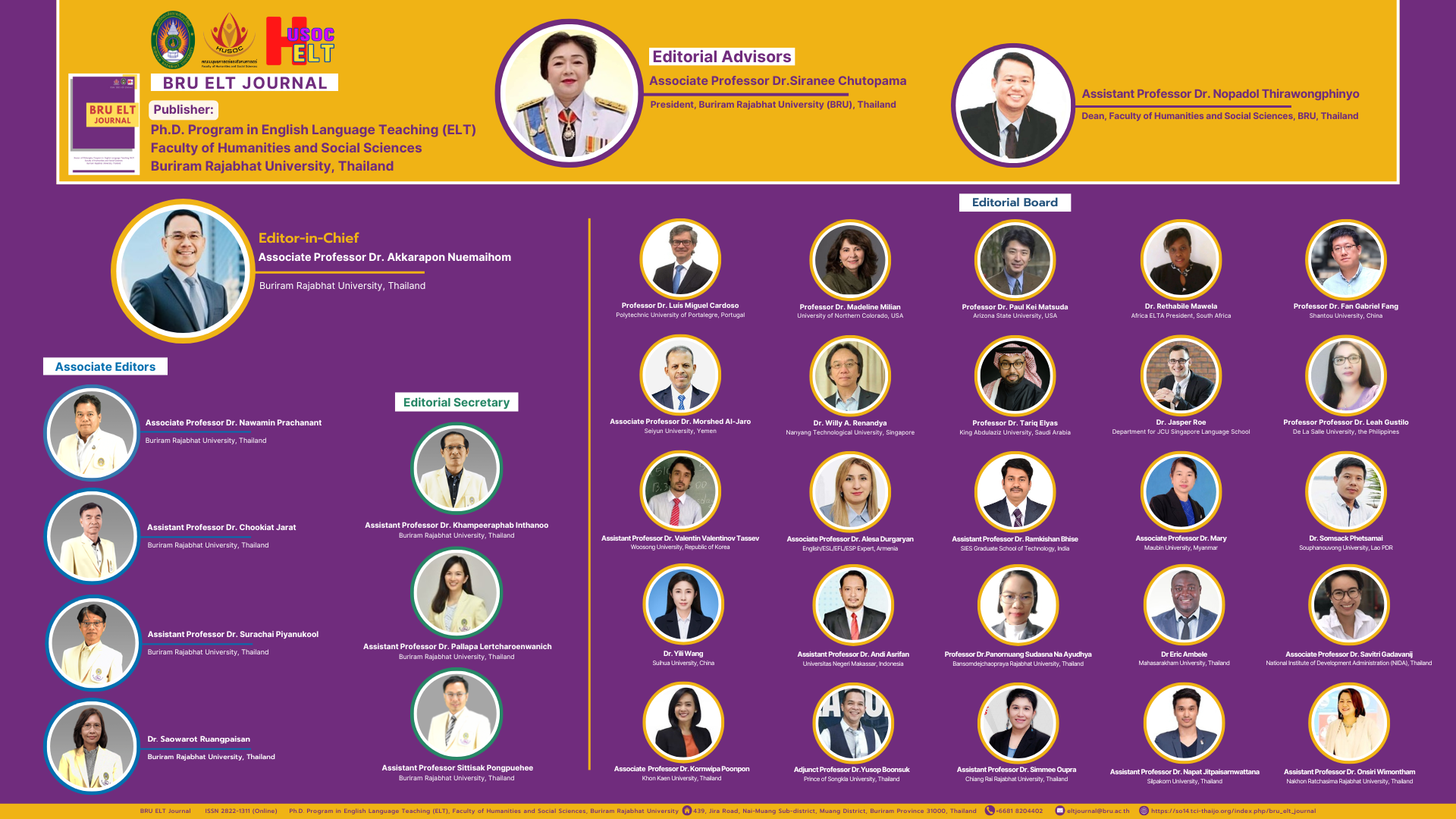Pedagogical Authority Practices of English Language Teaching in the Pandemic Time
DOI:
https://doi.org/10.14456/bej.2023.12Keywords:
English language teaching, pandemic time, pedagogical authority (PA)Abstract
A well-thought-out pedagogy is important to develop the quality of teaching and the way students learn. This study explores the practices of pedagogical approach in English language teaching by using pedagogical authority (PA), which has three dimensions: didactic (teaching particularly in having moral instruction), pedagogic (relating to teaching), and deontic (expressing responsibility or commitment) in university context of Myanmar. The author surveyed six female teachers and conducted in-depth written interviews to gain a comprehensive understanding of their emotions and experiences. The participants had different durations of teaching experience. The study was conducted in the department of English at five different Arts and Science universities during the 2021/2022 academic year. According to the interview responses of English language teachers who have variable degrees and length of teaching experience, the study found different PA practices demonstrating the three dimensions. Findings show that language teaching during and after the pandemic coveredall the three dimensions of PA practiced in university contexts. It suggests the presence of three types of interaction or relation from which pedagogical authority comes: didactic interaction, pedagogical interaction, and deontic interaction PA is established during the teacher-student interactions which is also thought to increase the quality of teaching and learning processes. It was also found that didactic and pedagogic interactions were identified as very important aspects of virtual classrooms in the early time of the Pandemic, while pedagogic and deontic were found to be more frequent in face-to-face classrooms of post-pandemic time. The findings of this study will support language teachers to rethink their teaching practices in the new post-pandemic time. Additionally, it will contribute to available practices for language teaching during urgent situations.
References
Al-Nofaie, H. (2020). Saudi university students’ perceptions towards virtual education during Covid-19 pandemic: A case study of language learning via blackboard. Arab World English Journal, 11, 4-20. https://doi.org/10. 24093/awej/vol11no3.1
Alzahrani, B., & Elyas, T. (2017). The implementation of critical thinking in a Saudi EFL context: Challenges and opportunities. Indonesian Journal of English Language Teaching and Applied Linguistics, 1, 133-141. https:// doi.org /10.21093/ijeltal.v1i2.21
Andriivna, B. O., Vasylivna, K. O., Pavlivna, K. O., & Mykhaylivna, S. V. (2020). Using distance EdTech for remote foreign language teaching during the COVID19 lockdown in Ukraine. Arab World English Journal: Special Issue on English in Ukrainian Context, No. 3, 4-15. https://doi.org/10.24093/awej/elt3.1
Chen, J., & Kent, S. (2020). Task engagement, learner motivation and avatar identities of struggling English language learners in the 3D virtual world. System, 88, Article ID: 102168.
Chung, S. J., & Choi, L. J. (2021). The development of sustainable assessment during the COVID-19 pandemic: The case of the English language program in South Korea. Sustainability, 13, 4499. https://doi.org/10.3390/su13084499
Fitria, T. N. (2020). Teaching English through online learning system during Covid-19 pandemic. Pedagogy: Journal of English Language Teaching, 8, 138-148. https://doi.org/10.32332/pedagogy.v8i2.2266
Harjunen, E. (2009). How do teachers view their own pedagogical authority?Teachers and Teaching: Theory and Practice, 15, 109-129. https://doi.org/10.1080/13540600802661345
Harjunen, E. (2011). Students’ consent to a teacher’s pedagogical authority. Scandinavian Journal of Educational Research, 55, 403-424. https://doi.org/10.1080/00313831.2011.587325
Inayati, N., Karifianto, D. M., & Jarum, J. (2021). Student awareness, attitude,affordances, and challenges in online autonomous English language learning. Bahasa dan Seni: Journal Bahasa, Sastra, Seni, dan Pengajarannya, 49, 28-39. https://doi.org/10.17977/um015v49i12021p28
Ishino, M., & Okada, Y. (2018). Constructing students’ deontic status by use of alternative recognitional for student reference. Classroom Discourse, 9, 95-111. https://doi.org/10.1080/19463014.2017.1407947
Khafaga, A. (2021). The perception of blackboard collaborate-based instruction by EFL majors/teachers amid COVID-19: A case study of Saudi universities.Journal of Language and Linguistic Studies, 17, 1160-1173. https://doi.org/10.17263/jlls.904145
Maican, M.-A., & Cocorada, E. (2021). Online foreign language learning in higher education and its correlates during the COVID-19 pandemic. Sustainability, 13, 781. https://doi.org/10.3390/su13020781
Medina, S. A. L. (2021). An online English teaching experience during Covid-19 pandemic: preliminary findings. Lingüísticay Literatura, 42, 203-220. https://doi.org/10.17533/udea.lyl.n80a13
Saini, R., Kovács, G., Faridghasemnia, M., Mokayed, H., Adewumi, O., Alonso, P.,Rakesh, S., & Liwicki, M. (2020). Pedagogical principles in the online teaching of text mining: A retrospection. Proceedings of the Fifth Workshop on Teaching NLP, 1-12. Association for Computational Linguistics. https://doi.org/10.18653/v1/2021.teachingnlp-1.1
Tran, A., Kerkstra, R. L., Gardocki, S. L., & Papuga, S. C. (2021). Lessons learned: Teaching in-person during the COVID-19 pandemic. Frontiers in Education, 6, Article ID: 690646. https://doi.org/10.3389/feduc.2021.690646
Villamizar, A., & Mejía, G. (2019). Fostering learner autonomy and critical reflection through digital video-journals in a university foreign language course. Reflective Practice, 20, 187-200. https://doi.org/10.1080/ 14623943. 2019.1575195
Wrighton, M. S., & Lawrence, S. J. (2020). Reopening colleges and universities during the COVID-19 pandemic. Annals of Internal Medicine, 173, 664-665. https://doi.org/10.7326/M20-4752






